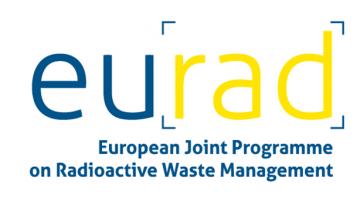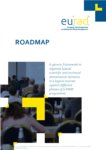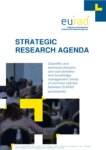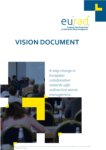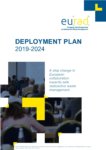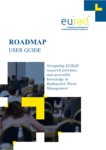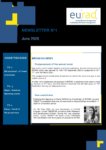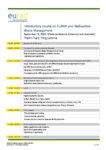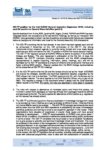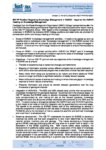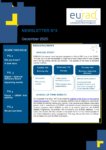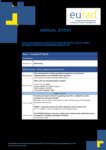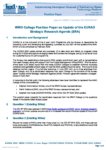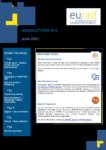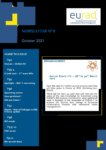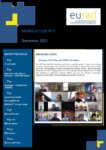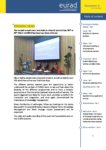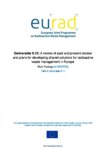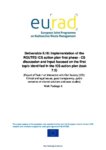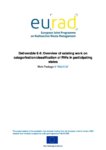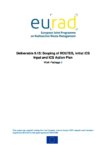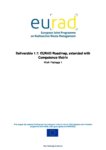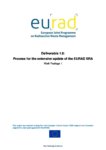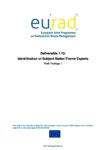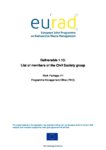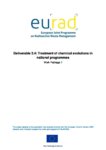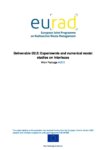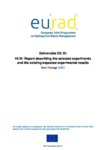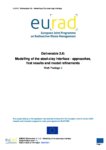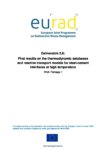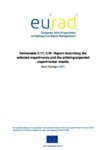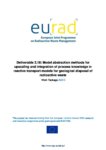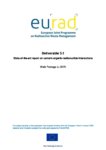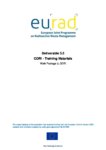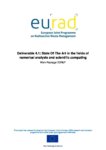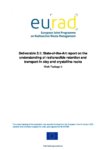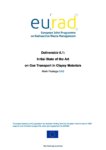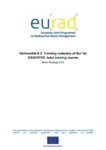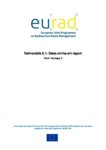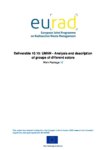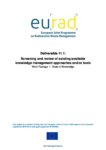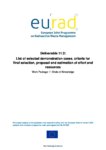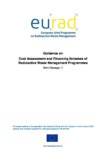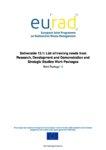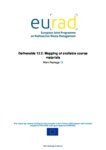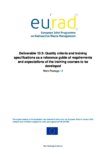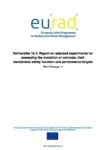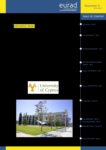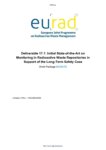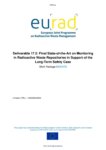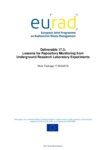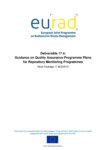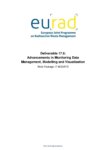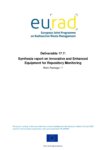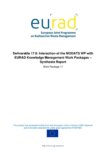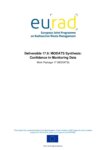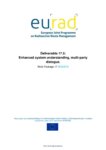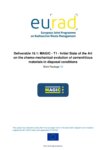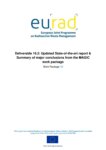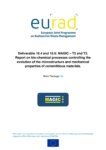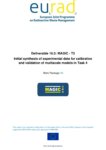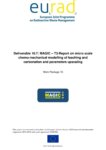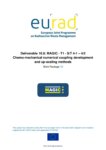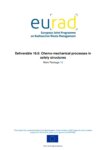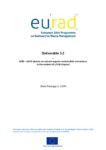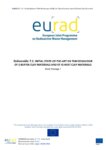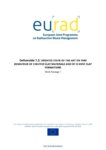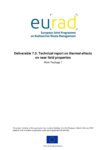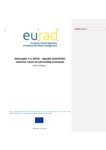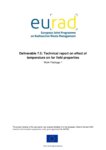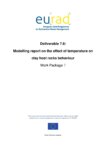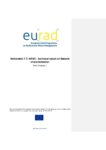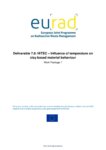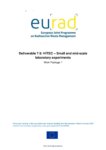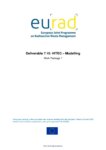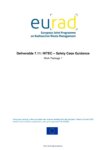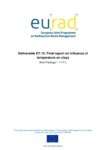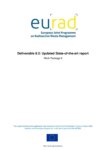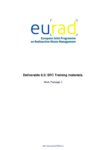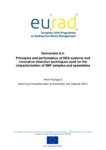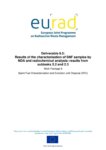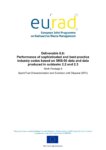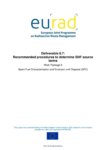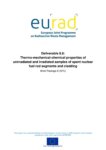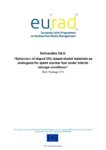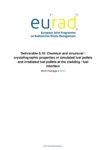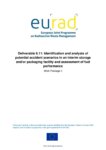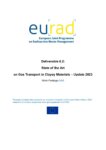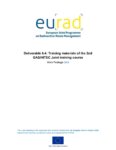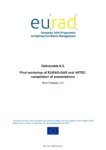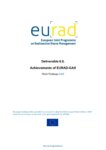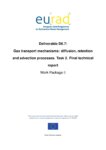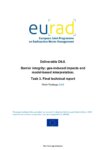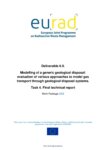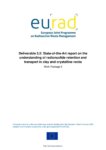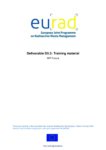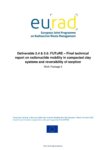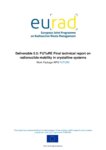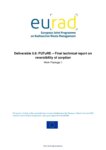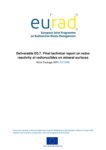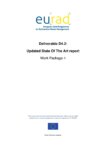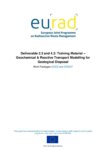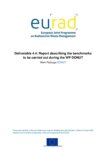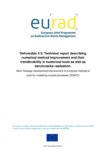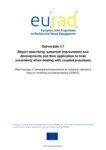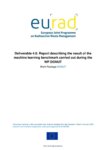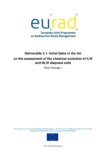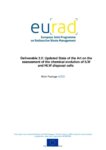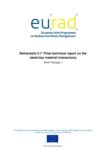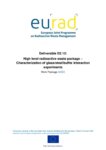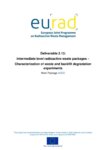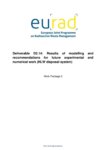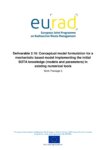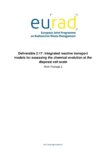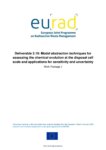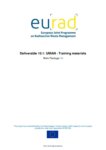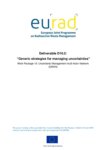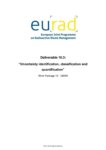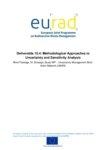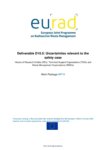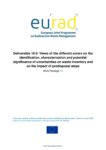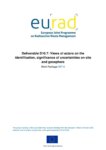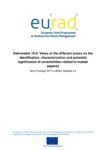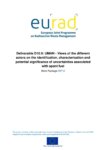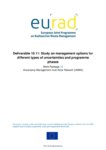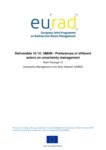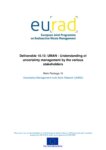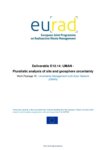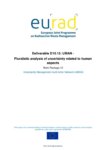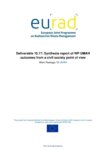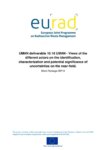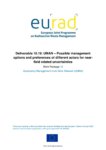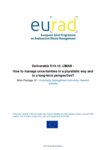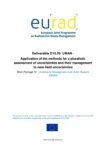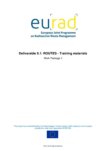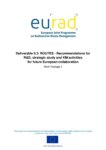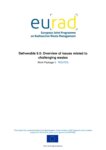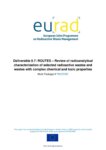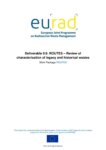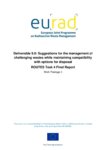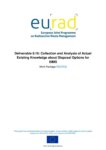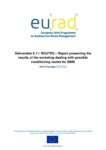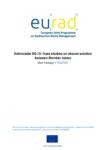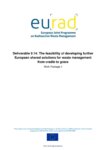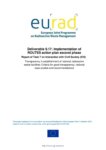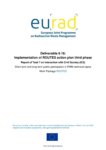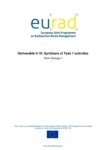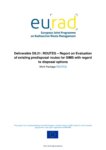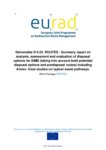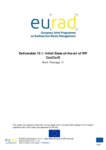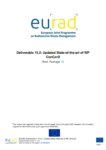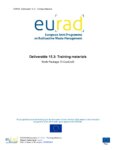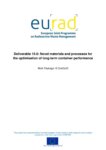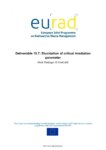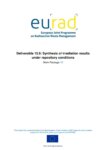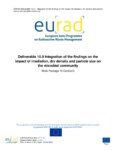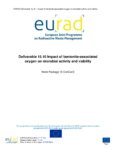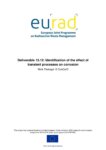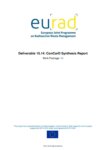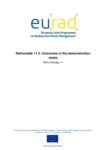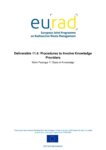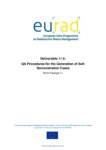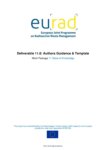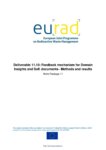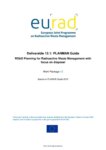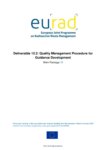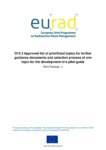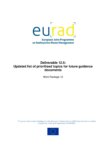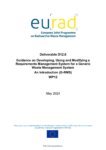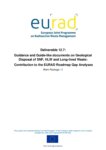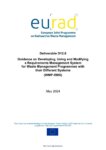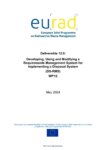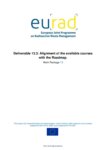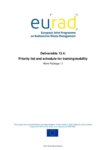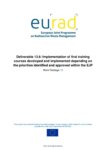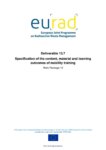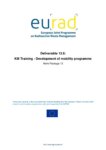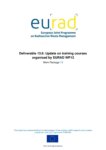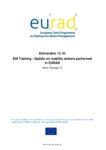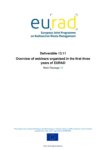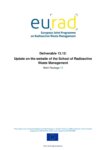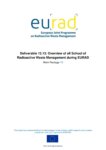EURAD: European Joint Programme on Radioactive Waste Managment
EURAD aimed to implement a joint Strategic Programme of research and knowledge management activities at the European level, bringing together and complementing EU Member State programmes in order to ensure cutting-edge knowledge creation and preservation in view of delivering safe, sustainable and publicly acceptable solutions for the management of radioactive waste across Europe now and in the future. It promoted more effective and efficient public RD&D funding in Europe, and a deepening of research-cooperation between Member States.
Overview
Project Dates: 1 June 2019 – 30 May 2024
Project Status: Finished
Project Website: www.ejp-eurad.eu
EURAD supported the implementation of the Waste Directive in EU Member-States, taking into account the various stages of advancement of national programmes. National radioactive waste management (RWM) programmes across Europe cover a broad spectrum of stages of development and stages of advancement, particularly with respect to their plans and national policy towards implementing geological disposal. Programmes differ significantly depending on the national waste inventory, with some member states only responsible for relatively small volumes of medical and research reactor wastes, compared to others that have comparatively large and/or complex waste inventories from large nuclear power (and fuel reprocessing) and defence programmes. Programmes also differ significantly in the way in which they are managed, particularly with respect to the national policy and socio-political landscape with respect to longer-term storage and geological disposal.
EURAD gathers Waste Management Organisations (WMOs), Technical Support Organisations (TSOs) and Research Entities (REs) from Member-States
- with no nuclear power programme operating, but with research, training or demonstration reactors, and/or other sources of radioactive waste;
- with a nuclear programme;
- with different amounts of radioactive waste to manage;
- at different stages of advancement in the implementation of their national radioactive waste management programme; and
- with plans for geological disposal for spent fuel, high-level waste and long-lived intermediate level waste, with different host rocks and different disposal concepts and at different stages of implementation.
EURAD Vision
EURAD published a Vision Document, in which it sets out its goals, governing principles, scope and objectives, and its vision, which is:
A step change in European collaboration towards safe radioactive waste management (RWM), including disposal, through the development of a robust and sustained science, technology and knowledge management programme that supports timely implementation of RWM activities and serves to foster mutual understanding and trust between Joint Programme participants.
EURAD envisaged the transition to a new era, featuring more effective and efficient public RD&D funding in Europe, and a deepening of research-cooperation between Member States. The aim was to implement a joint Strategic Programme of research and knowledge management activities at the European level, bringing together and complementing EU Member State programmes in order to ensure cutting edge knowledge creation and preservation in view of delivering safe, sustainable and publicly acceptable solutions for the management of radioactive waste across Europe now and in the future.
Objective
The EURAD Vision, Strategic Research Agenda (SRA) and Roadmap will be delivered through a 5-year implementation phase broken down into a set of Work Packages, Tasks and Sub-Tasks. The following four types of activities shall contribute to the delivery of EURAD objectives.
The main activities of EURAD consisted of RD&D activities aimed at developing and consolidating science and technology knowledge identified in the EURAD Strategic Research Agenda and Roadmap. There was a balance between operational RD&D in direct link with implementation of repository concepts, as well as safety concerns and prospective RD&D. This included short and long-term experiments and/or modelling work to demonstrate the robustness of the waste management concepts, to increase understanding and predictability of the impact of fundamental processes and their couplings, or to maintain scientific excellence and competences throughout the stepwise long-term management of radioactive waste.
- HITEC: Influence of temperature on clay-based material behaviour
- SFC: Spent fuel characterisation and evolution until disposal
- GAS: Mechanistic understanding of gas transport in clay materials
- FUTURE: Fundamental understanding of radionuclide retention
- DONUT: Development and improvement of numerical methods and tools for modelling coupled processes
- CORI: Cement-organic-radionuclide interactions
- ACED: Assessment of chemical evolution of ILW and HLW disposal cells
- MODATS: MOnitoring equipment and DAta Treatment for Safe repository operation and staged closure (MODATS)
- MAGIC: Chemo-Mechanical AGing of Cementitious materials
- CONCORD: CONtainer CORrosion under Disposal conditions
Complementary to RD&D and in support of the implementation of the Member States’ national programmes, Strategic Studies gave the opportunity for participants and expert contributors to network on methodological and strategic challenging issues that are common to various national programmes and in close link with scientific, technical and issues.
Beyond RD&D and Strategic Studies, EURAD included activities to consolidate efforts across Member-States on Knowledge Management – this included access to existing Knowledge (State-of-Knowledge), guiding the planning and implementation of a RD&D plan of national RWM programme, and developing/delivering training/mobility in line with core competencies.
Knowledge Management was enabled by three permanent WPs:
- State of knowledge: Activities under this WP consisted of developing a systematic approach of establishing the state-of-knowledge in the field of RWM research. This was done on a stepwise basis: i) establishing of procedures to document the state of knowledge (SoK); ii) testing and improving these procedures on a few demonstration topics/sub-topics (of the Roadmap); iii) performing a review on existing tools/platforms and evaluating the added-value of establishing such a platform dedicated to provide access to SoK developed in EURAD.
- Methodological guidance: Activities under this WP consisted of developing a comprehensive suite of instructional guidance documents that can be used by Member-States with RWM programmes that are at an early stage of development with respect to their national RWM programme. Such WP pursued and complemented the work initiated with the PLANDIS Guide.
- Training/mobility: Activities under this WP consisted of developing a diverse portfolio of tailored basic and specialised training courses under the umbrella of a “School of Radioactive Waste Management”, taking stock of and building upon already existing initiatives (i.e. IAEA and NEA) and creating new initiatives to bridge the identified gaps. The end-users are defined as professionals and potential new professionals at graduated and post-graduated level from EU and non-EU countries (via the IAEA and NEA programmes), and in particular the next generation of experts. This WP also organised a mobility programme to provide access to dedicated infrastructures associated with the Mandated Actors/Linked Third Parties within EURAD. This work was carried out in close interaction with European networks having a recognised experience in training/mobility in the field of RWM.
The successful implementation of RWM National Programmes relies on both scientific and technical aspects for a sound safety strategy and scientific and engineering excellence and societal (social, legal, ethical, political) aspects.
Civil Society Organisations (CSOs) are not research organisations but have a specific concern regarding RWM safety. They are involved in the implementation of the UNECE Aarhus Convention, which reinforces the requirements relating to information accessibility, public participation in decision-making, and access to justice in environmental matters. European programmes therefore undertake work to address these requirements through local and national stakeholder engagement activities to enable Civil Society (via representative organisations, e.g. Non-Government Organizations, Local Community Partnerships, etc.) to participate in defining their national RD&D programmes and the evaluation of RD&D results in the perspective of safety.
Interacting with Civil Society is important in this perspective and therefore one objective of EURAD was to allow interactions between WMOs, TSOs, REs and Civil Society Organisations. These interactions facilitated the translation of scientific/technical results and create the conditions for Civil Society Organisations to express their expectations and views. Such interactions improved the mutual understanding of RD&D performed to support the development of safe solutions in the processing and disposal of radioactive waste. It also contributed to the development of ideas, propositions and methodologies on how to interact with Civil Society to successfully convey scientific and technical results and uncertainties (inherently linked to the long timeframes and numerous processes considered for geological disposal), and on how to interact with Civil Society stakeholders in order to promote mutual benefit of the available knowledge, based on cooperation and sharing.
Funding Bodies
-
European Union
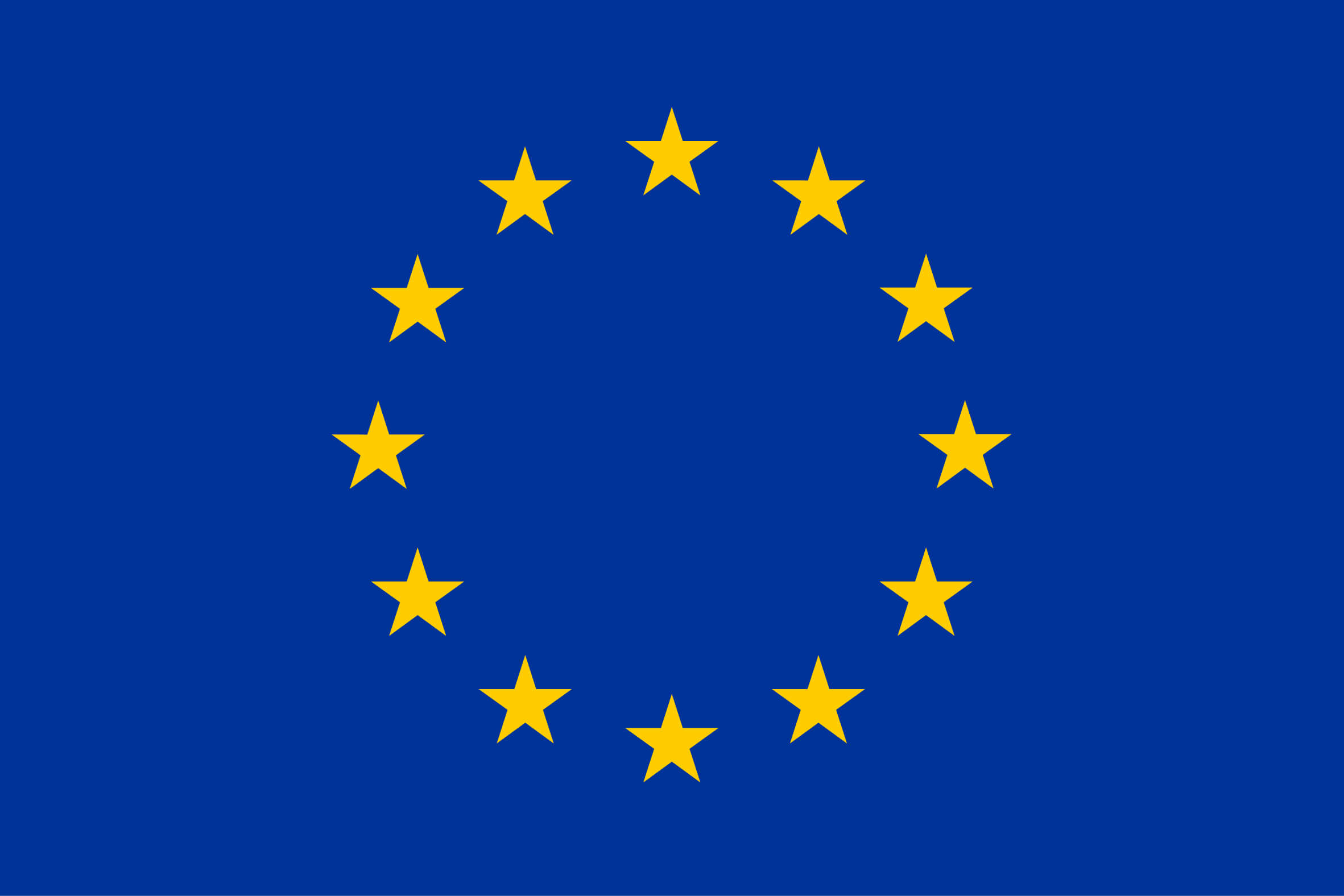
The EURAD(-1) project received funding from the European Union’s Horizon 2020 research and innovation programme under grant agreement number 847593. The total budget was 61.8 million Euros, with the EU contributing 32.5 million Euros. Further information is available at https://cordis.europa.eu/project/id/847593
Related Documents
Description: The EURAD Roadmap, which sets out clear objectives linking EURAD activities (as listed in the SRA) to milestones typical of different phases of a radioactive waste management.
Last updated: June 14, 2020
EURAD Strategic Research Agenda (SRA)
Description: The Strategic Research Agenda (SRA) of the European Joint Programme on Radioactive Waste Management (EURAD) describes the scientific and technical domains and sub-domains and knowledge management needs of common interest between EURAD participant organisations.
Last updated: June 14, 2020
Description: The EURAD Vision document, which sets out EURAD's Vision, goals, governing principles, scope and objectives, and how EURAD will complement national programmes.
Last updated: June 14, 2020
EURAD Newsletter #1 – June 2020
Description: 1st Newsletter of EURAD - published June 2020.
Last updated: June 24, 2020
Introductory Course on EURAD and Radioactive Waste Management – Preliminary Agenda
Description: The preliminary agenda for the Introductory Course on EURAD and Radioactive Waste Management, to be held by video conference on 14 September 2020.
Last updated: June 24, 2020
IGD-TP Position Paper 2019-01: Position for the First EURAD General Assembly
Description: IGD-TP Position Paper 2019-01 providing inputs to the first EURAD General Assembly. Published October 2019.
Last updated: October 14, 2019
IGD-TP Position Paper 2019-02: Position on Knowledge Management in EURAD
Description: IGD-TP Position Paper 2019-02 providing thoughts on knowledge management activities in EURAD. Published October 2019.
Last updated: October 14, 2019
IGD-TP Position Paper 2020-01: Feedback on EURAD so far
Description: IGD-TP Position Paper 2020-01 providing feedback on EURAD so far. Published March 2020.
Last updated: March 6, 2020
EURAD Newsletter #3 – December 2020
Description: EURAD's 3rd newsletter, published in December 2020.
Last updated: January 7, 2021
First EURAD Annual Event (2021) Flyer
Description: Flyer for the first EURAD annual event, to be held virtually on 16 - 18 March 2021.
Last updated: January 7, 2021
IGD-TP Position Paper 2021-01: WMO Response to EURAD SRA Plan
Description: IGD-TP Position Paper 2021-01 providing WMO College feedback on plans for revision of the EURAD SRA. Published May 2021.
Last updated: May 24, 2021
EURAD Newsletter #5 – June 2021
Description: EURAD's 5th newsletter, published in June 2021.
Last updated: June 30, 2021
EURAD Newsletter #6 – October 2021
Description: EURAD's 6th newsletter, published in October 2021.
Last updated: October 27, 2021
EURAD Newsletter #7 – December 2021
Description: EURAD's 7th newsletter, published in December 2021.
Last updated: December 16, 2021
EURAD Newsletter #8 – April 2022
Description: EURAD's 8th newsletter, published in April 2022.
Last updated: April 13, 2022
Description: Deliverable 9.12 of the EURAD/ROUTES project: "Studies and plans for developing shared solutions for radioactive waste management in Europe"
Last updated: June 16, 2022
Description: Deliverable 9.16 of the EURAD/ROUTES project: "Implementation of the ROUTES ICS action plan first phase - CS discussion and input focused on the first topic identified in the ICS action plan"
Last updated: June 16, 2022
Description: Deliverable 9.4 of the EURAD/ROUTES project: "Overview of existing work on categorization/classification of RWs in participating states"
Last updated: June 16, 2022
EURAD/ROUTES – D9.15: Scoping of ROUTES, Initial ICS Input and ICS Action Plan
Description: Deliverable 9.15 of the EURAD/ROUTES project: "Scoping of ROUTES, Initial ICS Input and ICS Action Plan"
Last updated: June 16, 2022
EURAD D1.7: EURAD Roadmap, extended with Competence Matrix
Description: EURAD deliverable 1.7: "EURAD Roadmap, extended with Competence Matrix"
Last updated: June 16, 2022
EURAD D1.8: Process for the extensive update of the EURAD SRA
Description: EURAD deliverable 1.8: "Process for the extensive update of the EURAD SRA"
Last updated: June 16, 2022
EURAD D1.10: Identification of Subject Matter/Theme Experts
Description: EURAD deliverable 1.10: "Identification of Subject Matter/Theme Experts"
Last updated: June 16, 2022
EURAD D1.13: List of members of the Civil Society group
Description: EURAD Deliverable 1.13: "List of members of the Civil Society group"
Last updated: June 16, 2022
EURAD/ACED D2.4: Treatment of chemical evolutions in national programmes
Description: EURAD/ACED Deliverable 2.4: "Treatment of chemical evolutions in national programmes"
Last updated: June 16, 2022
EURAD/ACED D2.5: Experiments and numerical model studies on interfaces
Description: EURAD/ACED Deliverable 2.5: "Experiments and numerical model studies on interfaces"
Last updated: June 16, 2022
Description: EURAD/ACED Deliverable 2.10: "HLW: Report describing the selected experiments and the existing/expected experimental results"
Last updated: June 16, 2022
Description: EURAD/ACED Deliverable 2.6: "Modelling of the steel-clay interface - approaches, first results and model refinements"
Last updated: June 16, 2022
Description: EURAD/ACED Deliverable 2.8: "First results on the thermodynamic databases and reactive transport models for steel-cement interfaces at high temperature"
Last updated: June 16, 2022
Description: EURAD/ACED Deliverable 2.11: "ILW: Report describing the selected experiments and the existing/expected experimental results"
Last updated: June 16, 2022
Description: EURAD/ACED Deliverable 2.18: "Model abstraction methods for upscaling and integration of process knowledge in reactive transport models for geological disposal of radioactive waste"
Last updated: June 16, 2022
EURAD/CORI D3.1: State-of-the-art report on cement-organic-radionuclide interactions
Description: EURAD/CORI Deliverable 3.1: "State-of-the-art report on cement-organic-radionuclide interactions"
Last updated: June 16, 2022
EURAD/CORI D3.3: Training Materials
Description: EURAD/CORI Deliverable 3.3: "Training Materials" on cement-organic- radionuclide-interactions.
Last updated: June 16, 2022
EURAD/DONUT D4.1: State Of The Art in the fields of numerical analysis and scientific computing
Description: EURAD/DONUT Deliverable 4.1: "State Of The Art in the fields of numerical analysis and scientific computing"
Last updated: June 16, 2022
Description: EURAD Deliverable 5.1: "State-of-the-Art report on the understanding of radionuclide retention and transport in clay and crystalline host rocks"
Last updated: June 16, 2022
EURAD/GAS D6.1: Initial State of the Art on Gas Transport in Clayey Materials
Description: EURAD/GAS Deliverable 6.1: "Initial State of the Art on Gas Transport in Clayey Materials"
Last updated: June 16, 2022
EURAD/GAS D6.3: Training Materials of the 1st GAS/HITEC joint training course
Description: EURAD/GAS Deliverable 6.3: "Training Materials of the 1st GAS/HITEC joint training course"
Last updated: June 16, 2022
EURAD/SFC D8.1: Spent Fuel Characterization and Evolution Until Disposal
Description: EURAD/SFC Deliverable 8.1: "Spent Fuel Characterization and Evolution Until Disposal".
Last updated: June 17, 2022
EURAD/UMAN D10.10: UMAN – Analysis and description of groups of different actors
Description: EURAD/UMAN Deliverable 10.10: "UMAN - Analysis and description of groups of different actors".
Last updated: June 17, 2022
EURAD D11.1: Screening and review of existing/available knowledge management approaches and/or tools
Description: EURAD Deliverable 11.1: "Screening and review of existing/available knowledge management approaches and/or tools".
Last updated: June 17, 2022
Description: EURAD Deliverable 11.2: "List of selected demonstration cases, criteria for final selection, proposal and estimation of effort and resources".
Last updated: June 17, 2022
Description: The main purpose of this guide was to provide information on the cost estimation in relation to the establishment, development, implementation and improvement of a waste disposal programme and to provide insight into the implementation of a financial scheme that ensures the efficient and sustainable financing of the programme.
Last updated: June 17, 2022
Description: EURAD Deliverable 13.1: "List of training needs from Research, Development and Demonstration and Strategic Studies Work Packages".
Last updated: June 17, 2022
EURAD D13.2: Mapping of available course materials
Description: EURAD Deliverable 13.2: "Mapping of available course materials".
Last updated: June 17, 2022
Description: EURAD Deliverable 13.5: "Quality criteria and training specifications as a reference guide of requirements and expectations of the training courses to be developed".
Last updated: June 17, 2022
Description: EURAD/MAGIC Deliverable 16.3: "Report on selected experiments for assessing the evolution of concrete, their mechanical safety function and performance targets".
Last updated: June 17, 2022
EURAD Newsletter #9 – June 2022
Description: EURAD's 9th newsletter, published in June 2022.
Last updated: June 28, 2022
Description: This report provides an overview of the current state-of-the-art on monitoring in radioactive waste repositories in support of the long-term safety case, at the start of the MODATS WP. In particular, it presents the state-of-the-art on monitoring objectives, strategies, technologies and data. It is a reference document for EURAD actors, providing knowledge that will be updated at the end of the MODATS WP as new understanding becomes available.
Last updated: February 10, 2025
Description: This report is one a series of deliverables from the MODATS WP. It is the final state-of-the-art (SOTA) report at the end of MODATS, which supersedes an initial SOTA report developed during MODATS (Deliverable 17.1). The initial SOTA provided an overview of RD&D in repository monitoring, spanning the last few decades and including the latest knowledge on monitoring objectives, strategies, technologies and data. Building on the initial SOTA, this report provides an update on the current repository monitoring knowledge, based on the progress made in MODATS mainly relating to monitoring data management and use and technological RD&D.
Last updated: February 10, 2025
Description: This report summarises the survey responses to develop lessons for repository monitoring relating to the design of monitoring systems and the acquisition, management and use of monitoring data. The lessons are discussed in detail in Section 3 of this report. It should be noted that the lessons are exclusively learned from the survey. However, further understanding of these aspects of monitoring is available elsewhere.
Last updated: February 10, 2025
Description: The guidance on Quality Assurance Programme Plans (QAPPs) provided in this document offers a framework for addressing the challenges posed by repository monitoring. By structuring a QAPP into five main sections and offering flexibility in its implementation, waste management organisations and stakeholders could confidently develop programme-specific QA documentation for their monitoring activities. This guidance is designed to support reliable, long-term monitoring data acquisition, and data treatment, fostering confidence in the data provided by the programme. Through continuous improvement, adaptation to technological advancements, and responsive decision-making, a QAPP would ensure that monitoring programmes remain effective, credible, and beneficial over the entire duration of repository operations.
Last updated: February 10, 2025
MODATS: Deliverable 17.6: Advancements in Monitoring Data Management, Modelling and Visualisation
Description: The work on data management, modelling and visualisation was based on six test cases: • ALC1605 Test Case (undertaken by Amvalor, Andra and ENSAM): The ALC1605 test case used thermal monitoring data to develop methods for combined physics-based and data-driven-modelling of repository evolution. • FE Experiment Test Case 1 (Nagra): Nagra’s FE experiment test case used data from the FE experiment to progress approaches to quality control, data processing, and data storage. • FE Experiment Test Case 2 (PSI): PSI’s FE experiment test case used temperature and relative humidity sensor data to develop machine learning-assisted physics-based and data-driven 3D heat transport modelling. • FE Experiment Test Case 3 (UFZ): UFZ’s FE experiment test case focused on the development of interactive visualisation systems, and visualisation tools for the comparison of simulation and observation data. • POPLU and Prototype Repository Experiments Test Case (VTT): The POPLU and Prototype Repository experiments test case developed tools and approaches for managing monitoring data, and provided illustrations of how these tools and approaches could be applied during repository monitoring. • PRACLAY Experiment Test Case (EURIDICE): The PRACLAY test case developed a structured and uniform approach to data processing and storage of monitoring data. The conclusions from the work are presented in this document.
Last updated: February 10, 2025
Description: The work on data management, modelling and visualisation was based on six test cases: • ALC1605 Test Case (undertaken by Amvalor, Andra and ENSAM): The ALC1605 test case used thermal monitoring data to develop methods for combined physics-based and data-driven-modelling of repository evolution. • FE Experiment Test Case 1 (Nagra): Nagra’s FE experiment test case used data from the FE experiment to progress approaches to quality control, data processing, and data storage. • FE Experiment Test Case 2 (PSI): PSI’s FE experiment test case used temperature and relative humidity sensor data to develop machine learning-assisted physics-based and data-driven 3D heat transport modelling. • FE Experiment Test Case 3 (UFZ): UFZ’s FE experiment test case focused on the development of interactive visualisation systems, and visualisation tools for the comparison of simulation and observation data. • POPLU and Prototype Repository Experiments Test Case (VTT): The POPLU and Prototype Repository experiments test case developed tools and approaches for managing monitoring data, and provided illustrations of how these tools and approaches could be applied during repository monitoring. • PRACLAY Experiment Test Case (EURIDICE): The PRACLAY test case developed a structured and uniform approach to data processing and storage of monitoring data. The conclusions from the work are presented in this document.
Last updated: February 10, 2025
Description: This report provides a detailed description of the approach for organising interactions between MODATS and knowledge management (KM) WPs developed in the first year of the MODATS WP implementation (see Section 2), along with the outcomes of the conducted KM activities (see Section 3) achieved in the frame of MODATS WP implementation. Also, report reflects on lessons learned, highlighting challenges in involving experts in KM activities and the importance of integrating KM into work plans from the outset. It acknowledges the effectiveness of systematic interaction between WPs and the flexibility required to adapt to programme needs.
Last updated: February 10, 2025
MODATS: Deliverable 17.9: MODATS Synthesis: Confidence in Monitoring Data
Description: This document integrates the work undertaken across the different activities in MODATS to demonstrate how the results of the RD&D undertaken consolidate the implementation strategy for monitoring systems by developing methods through which confidence can be demonstrated in the data acquired and benefits derived for repository implementation.
Last updated: February 10, 2025
MODATS: Deliverable 17.5: Enhanced system understanding, multi-party dialogue
Description: The workshops organised in the frame of MODATS sub-task 2.5 highlighted 6 major outcomes regarding monitoring: the definition of the major concepts, the questions about data, models and digital twins, the knowledge management challenges, the long-term issues, the core concepts of confidence and trust and the link with civil society. These outcomes which emerged in multi-party dialogues, helped to lay the foundations for a socio-technical interpretation of monitoring, that could be used for the organisation of other socio-technical exchanges related to GDF monitoring, and opened axis of future activities. This report presents the proposed methodological approach and its associated feedback, as well as the main outcomes of the discussions. It also proposes an interpretation of the way the socio-technical complexity of the monitoring system for a geological disposal facility can be addressed between research partners and civil society members.
Last updated: February 10, 2025
Description: This report is an initial State-of-The-Art (SOTA) literature review in the MAGIC WP (Work Package) dedicated to synthetize the knowledge on cementitious materials evolution in radioactive waste geological disposal conditions.
Last updated: February 10, 2025
Description: The present report aims to consolidate all the key and noteworthy results achieved by the partners working over the past three years in the MAGIC work package (WP). It is the result of the analysis of five deliverables containing the entirety of the detailed scientific production of the WP. While MAGIC has been structured into tasks depending on the scale at which the chemo-mechanical ageing of cementitious materials in a geological disposal environment was studied, this report provides a different perspective. Indeed, it cross-references all the results from all tasks with a contextualization related to the life cycle to which the concretes will be exposed: from the operational phase to the long-term phase.
Last updated: February 10, 2025
Description: Report on selected experiments for assessing the evolution of concrete, their mechanical safety function and performance targets
Last updated: February 10, 2025
Description: This report provides a summary of the results and protocol development for the Task 2 and Task 3 experimental studies. It consists of a set of ongoing (started before EURAD) and new experiments with a selection of mortar/concrete samples in contact with various solutions and atmospheres (CO2), which are representative of different host rocks, with or without microbial activity. Results show the chemical/textural changes (mineralogical evolutions, chemical changes, porosity, transport properties) and their impact on the mechanical properties (Young modulus, compressive/tensile strengths, etc).
Last updated: February 10, 2025
Description: This report provides an initial synthesis of experimental data obtained in Task 3, which are devoted to calibration and validation of multiscale models developed in Task 4.
Last updated: February 10, 2025
Description: The report provides analysis of existing numerical models and describe the newest development accomplished in the course of WP-MAGIC. In particular, it presents the results on micro scale chemo-mechanical modelling of leaching and carbonation as well as upscaling approaches for cementitious systems obtained under the framework of EURAD project WP-MAGIC.
Last updated: February 10, 2025
Description: The objective of this report is to summarise the modelling work of the MAGIC WP and to establish a permanent reference chemo-mechanical model for the deterioration of both Portland and low pH concretes in relevant repository environments, taking into account representative boundary conditions. The report focuses on Task 4 and in particular on the development of chemomechanical numerical coupling and up-scaling methods. The collaboration between participants from different organisations and institutions has resulted in a comprehensive review of chemomechanical numerical coupling and upscaling of mechanical properties related to cement alteration.
Last updated: February 10, 2025
MAGIC: Deliverable 16.9: Chemo-mechanical processes in safety structures
Description: The objectives of this deliverable are, first, to explain the scientific bases of the chemo-mechanical models used in the EURAD MAGIC 4.3 subtask in order to calculate the base case defined in the project. Next, the aim is to give results of chemo-mechanical simulations of base case study performed with the chemical models coupled with mechanical ones.
Last updated: February 10, 2025
Description: This document presents the state-of-art on key topics addressed in CORI and provides supporting background information relevant to the specific scientific and technical context investigated in this project. New advances made within CORI are highlighted for the three R&D Tasks.
Last updated: February 12, 2025
CORI Deliverable 3.4 – Training Materials UPDATE
Description: This document contains the Deliverable on CORI Training Materials D3.4.
Last updated: February 12, 2025
Description: This final report summarizes main technical achievements in CORI generated in the RD&D Tasks 2, 3, and 4 (which are presented in the combined CORI Deliverable D3.6,7,8 in much more detail).
Last updated: February 12, 2025
Description: To meet its objectives the WP3 CORI is divided in three R&D oriented tasks: • Task 2: Organic degradation • Task 3: Organic-Cement-Interactions • Task 4: radionuclides-Organic-Cement-Interactions This final report constitutes the WP3 CORI deliverables 3.6, 3.7 and 3.8 and provides the final results obtained in each of these R&D tasks.
Last updated: February 12, 2025
Description: This report presents the main characteristics of the national concepts of the organizations involved in EURAD-WP7 HITEC (ANDRA, BGE, ENRESA, EURIDICE, NAGRA, POSIVA, RWM, SKB and SÚRAO) and particularly of their thermal limits. An overview of what is known about the clay materials to be used in the WP, both as buffer and as host rock, is given, including the effect of temperature on the materials’ behaviour. Large-scale tests relevant in terms of the temperatures involved have been identified and described, and they could be later used as benchmark exercises during the Project. The state of modelling approaches is presented, mostly particularising their application to specific tests.
Last updated: February 12, 2025
Description: This is an update to EURAD/HITEC Deliverable 7.1: "Initial State-Of-The-Art on THM Behaviour of I) Buffer Clay Materials and of II) Host Clay Materials" based on progress made during HITEC.
Last updated: February 12, 2025
HITEC Deliverable 7.3: Technical report on thermal effects on near field properties
Description: This report describes the thermal effects on near field properties.
Last updated: February 12, 2025
HITEC Deliverable 7.4: HITEC – Specific GAS/HITEC technical report on self-sealing processes
Description: This final report presents the laboratory tests performed in the GAS and HITEC work packages, their results, our understanding of the self-sealing process, the similarities and differences between the different claystones and the effectiveness of the self-sealing process under temperature and gas.
Last updated: February 12, 2025
HITEC Deliverable 7.5: Technical report on effect of temperature on far field properties
Description: This report describes the thermal effects on far field properties.
Last updated: February 12, 2025
HITEC Deliverable 7.6: Modelling report on the effect of temperature on clay host rocks behaviour
Description: The present report - D7.6 - Modelling report on the effect of temperature on clay host rocks behaviour - is the final deliverable for subtask 2.3. Subtask 2.3 focused on the development of THM models, their calibration with laboratory experiments and benchmarking to generic cases and in-situ experiments.
Last updated: February 12, 2025
HITEC Deliverable 7.7: Technical Report on Material Characterisation
Description: A number of different high temperature experiments were performed with bentonite clays. This report documents the results.
Last updated: February 12, 2025
HITEC Deliverable 7.8: Influence of temperature on clay-based material behaviour
Description: This report presents an overview of Task 3.2 progress in the HITEC work package of the European Joint Programme on Radioactive Waste Management programme. The objectives of this task are focussed around evaluating the behaviour of clay buffer materials at high temperature.
Last updated: February 12, 2025
HITEC Deliverable 7.9: Small and mid-scale laboratory experiments
Description: CIEMAT and SÚRAO [CTU] performed thermo-hydraulic tests intended to simulate the conditions of the bentonite buffer in the repository. Namely two kinds of tests were performed: 1. hydration tests under thermo-hydraulic gradient (TH tests), and 2. hydration tests under high isothermal temperature. This report documents the results of these experiments.
Last updated: February 12, 2025
HITEC Deliverable 7.10: Modelling
Description: This report presents a summary of ongoing modelling activities within EURAD WP7 HITEC (Influence of temperature on clay-based material behaviour). Three teams have been involved, namely CIEMAT (UPC), SURAO (CTU and CU) and VTT.
Last updated: February 12, 2025
HITEC Deliverable 7.11: Safety Case Guidance
Description: This report provides guidance for safety case development and repository optimisation based on the outcomes of EURAD WP7 HITEC (Influence of temperature on clay-based material behavior).
Last updated: February 12, 2025
HITEC Deliverable 7.12: Final report on influence of temperature on clays
Description: Final summary report of HITEC tasks.
Last updated: February 12, 2025
SFC Deliverable 8.2: Updated State-of-the-art report
Description: Updated State-of-the-art report for Spent Fuel Characterisation and Evolution Until Disposal
Last updated: February 12, 2025
SFC Deliverable 8.3: Training materials
Description: This report collects the main training materials (documents used in all kind of training actions, such as courses, for new members or grant holders training, etc.) produced by WP8 team in tasks 2-4.
Last updated: February 12, 2025
Description: Technical report on the principles and performance of non-destructive assay (NDA) systems and innovative detection techniques used for the characterisation of spent nuclear fuel (SNF) samples and assemblies
Last updated: February 12, 2025
Description: This deliverable provides the experimental data that were produced within WP8 of EURAD to assess the performance of depletion calculations and to define procedures to verify the quality of fuel related input data that are provided by the operator. The report includes references to the fuel related data that are required to perform depletion calculations. The results presented in this deliverable are essential input for the EURAD deliverables 8.6 and 8.7.
Last updated: February 12, 2025
Description: In this EURAD deliverable, the performance of depletion codes was verified using experimental data available in the SFCOMPO database and reported in the open literature together with additional data that were produced within WP8 and specified in EURAD deliverable 8.5.
Last updated: February 12, 2025
SFC Deliverable 8.7: Recommended procedures to determine SNF source terms
Description: This report describes the recommended procedures to determine SNF source terms
Last updated: February 12, 2025
Description: The report addresses the experimental characterisation, thermo-mechanical modelling and performance of unirradiated and irradiated samples of spent nuclear fuel rod segments and cladding.
Last updated: February 12, 2025
Description: This deliverable gives a detailed overview of information available about experimental campaigns for wet and dry storage experiments.
Last updated: February 12, 2025
Description: This final report summarises the experimental results gained within subtask 3.3 until the 48th month of the project. Subtask 3.3 contributes to the knowledge increase on pellet-cladding interaction under conditions of extended storage, transport and handling of SNF rods.
Last updated: February 12, 2025
Description: This report identifies and evaluates various potential accident scenarios in interim storage and packaging facilities. The methodologies and models developed herein can be applied to assess and mitigate risks associated with SNF management, ultimately enhancing the safety protocols.
Last updated: February 12, 2025
Description: The deliverable discusses probable accident scenarios for SNF packages, the accident initial events that can lead to such accidents and corresponding consequence analysis. In addition, design measures to prevent accidents and eliminate the consequences of accidents are described.
Last updated: February 12, 2025
GAS Deliverable 6.2: State of the Art on Gas Transport in Clayey Materials – Update 2023
Description: This document is the second state-of-the-art report of EURAD-GAS. Building on SOTA 1, it provides a shared view of the EURAD-GAS partners on the current knowledge of gas transport through clayey materials, enriched by the knowledge gained within EURAD-GAS and beyond. It also shows how this knowledge is currently being used in the context of the development of geological disposal systems in several European countries.
Last updated: February 12, 2025
GAS Deliverable 6.4: Training materials of the 2nd GAS/HITEC Joint training course
Description: This document is the training material used in the second GAS/HITEC Joint training course which was organised jointly with the ALERT Geomaterials network.
Last updated: February 12, 2025
GAS Deliverable 6.5: Final workshop of EURAD-GAS and -HITEC: compilation of presentations
Description: This document collates the presentations given in the final EURAD-GAS and -HITEC workshop. The workshop provided an overview of the progress made in understanding heat transfers, water and gas transport and their consequences in terms of stress and strain evolution in a geological repository. It also provided an opportunity to disseminate the results and expected impacts of the two work packages to a wide audience.
Last updated: February 12, 2025
GAS Deliverable 6.6: Achievements of EURAD-GAS
Description: This document, Deliverable D6.6, briefly presents the main achievements of EURAD-GAS. It provides an overview of the main results, per task and per partner, and conclusions of the different tasks. Additionally, it presents the current understanding of gas transport in clayey materials, the impact at the repository scale and the fate of radionuclides.
Last updated: February 12, 2025
Description: This report summarises the final results of the task 2 of the WP GAS of EURAD (Mechanical understanding of gas transport in clay materials). Task 2 “Transport mechanisms” focused on the characterisation of the main gas transport mechanisms which will take place in a disposal system in the post-closure phase. Subtask 2.1 was dedicated to gas diffusion and retardation processes at high level of water saturation, while Subtask 2.2 dealt with advection processes (displacement vs. dilation).
Last updated: February 12, 2025
Description: This is the final documentation of the achievements of EURAD- GAS requires a thematic report on barrier integrity (Deliverable D6.8), which consists of 2 parts: • Part 1: Final Report on gas induced impacts comprising the experimental results of Subtasks T3.1 and T3.2. • Part 2: Model-based interpretation by Subtask T3.3).
Last updated: February 12, 2025
Description: This final report mainly focusses on the compilation of the work done in Task 4.2 during the EURAD-GAS project.
Last updated: February 12, 2025
Description: This state-of-the-art report (SOTA) aims at providing a comprehensive overview of our current understanding of the underlying processes contributing to the radionuclide retention and migration in clay and crystalline host rocks. For each process, a brief theoretical background is provided together with current methodologies used to study these processes as well as references to key data.
Last updated: February 12, 2025
FUTURE Deliverable 5.3: Training material
Description: This is the material from an education and training event on radionuclide transport and retention took place on 17th November 2021.
Last updated: February 12, 2025
Description: This is the final technical report on radionuclide mobility in compacted clay systems and reversibility of sorption
Last updated: February 12, 2025
FUTURE Deliverable 5.5: Final technical report on radionuclide mobility in crystalline systems
Description: For the FUTURE work package, a number of research topics focussing on crystalline rock were combined. The work package addressed the connected pore network and surface topography, transport and sorption processes as well as the impact of surface potential, water chemistry, pore size and grain boundaries. Overarching goals covering all the latter topics were formulated such as the quantitative and mechanistic understanding of the impact of site-specific mobility of species; the impact of specific surface properties of materials (diffusive double layer, surface potential), the role of grain boundaries, the effect of water saturation, content and chemistry (pH, ionic strength) as well as the impact of pore size variability (nanometer pore scale: meso-/ macropores). The various objectives are addressed in individual subchapters dealing with sorption processes and the impact of surface charge (Chapters 1-4), addressing transport processes in fractures (Chapter 5), and illustrating a long-term in situ experiment (Chapter 6) in crystalline host rocks.
Last updated: February 12, 2025
FUTURE Deliverable 5.6: Final technical report on reversibility of sorption
Description: This is the final technical report on reversibility of sorption. The objectives of this document is to enhance the quantitative and mechanistic understanding of the impact on radionuclide mobility wrt. effects of solution composition and speciation, surface charge and microstructural properties of argillaceous porous media.
Last updated: February 12, 2025
Description: This document summarizes and compiles the main results that were obtained in the frame of the EURAD project with regards to the synthesis of Fe-bearing minerals of interest for radwaste storage, their morphological, mineralogical, and crystallographic characterization, as well as the characterization of clay-rocks, and of the study of their reactivity towards redox-sensitive elements.
Last updated: February 12, 2025
DONUT Deliverable 4.2: Updated State Of The Art report
Description: This document provides an update of the DONUT state of the art report (deliverable D4.1) and it assess the current state-of-the-art for the DONUT work package integrating the results gathered during the project duration.
Last updated: February 12, 2025
Description: This report contains the aims and learning outcomes, the training course description, and the abstracts, reading material and slides from the lectures given at the training course. The training was organized at the University of Bern, Switzerland on February 6-10, 2023.
Last updated: February 12, 2025
DONUT Deliverable 4.4: Report describing the benchmarks to be carried out during the WP DONUT
Description: Report describing the benchmarks to be carried out during the WP DONUT.
Last updated: February 12, 2025
Description: Technical report describing numerical method improvement and their transferability in numerical tools as well as benchmarks realization.
Last updated: February 12, 2025
Description: Report describing numerical improvement and developments and their application to treat uncertainty when dealing with coupled processes. This document is a compilation of the results of the work carried out in the framework of DONUT WP4. All participating institutions have contributed to this document by briefly describing their efforts to address uncertainties and sensitivity analysis.
Last updated: February 12, 2025
Description: Report describing the result of the machine learning benchmark carried out during the WP DONUT
Last updated: February 12, 2025
Description: Deliverable 2.1: Initial State of the Art on the assessment of the chemical evolution of ILW and HLW disposal cells
Last updated: February 13, 2025
Description: The focus of this report is to give an update of the state-of-the-art by highlighting the main insights obtained in ACED.
Last updated: February 13, 2025
ACED Deliverable 2.7: Final technical report on the steel/clay material interactions
Description: Subtask 2.1 of the ACED work package of EURAD relied upon a combined modelling-experimental approach to provide key information on carbon steel/clay material interface interactions that are important for understanding the long-term evolution of engineered barrier systems for a deep geological repository (DGR). The results obtained provide basic data for the upscaling from component/interface process level models to waste package scale models (Task 3) and disposal cell (Task 4) models. This is the final technical report on the steel/clay material interactions.
Last updated: February 13, 2025
ACED Deliverable 2.9: Final technical report on the steel/cement material interactions
Description: This is the final technical report on the steel/cement material interactions.
Last updated: February 13, 2025
Description: This document presents the results of characterization of glass/steel/buffer interaction experiments
Last updated: February 13, 2025
Description: This document presents the results of characterization of waste and backfill degradation experiments
Last updated: February 13, 2025
Description: This document presents the results of modelling and recommendations for future experimental and numerical work (HLW disposal system)
Last updated: February 13, 2025
Description: This document presents a description of ILW modelling results and recommendations for future experiments and numerical work
Last updated: February 13, 2025
Description: This deliverable presents conceptual and mathematical formulations of mechanistic-based models which take into account the initial state-of-the-art knowledge on models and parameters and are linked to the existing numerical tools.
Last updated: February 13, 2025
Description: This deliverable presents integrated reactive transport models for assessing the chemical evolution at the disposal cell scale
Last updated: February 13, 2025
Description: This deliverable presents model abstraction techniques for assessing the chemical evolution at the disposal cell scale and applications for sensitivity and uncertainty
Last updated: February 13, 2025
UMAN Deliverable 10.1: Training materials
Description: This report contains the aims, the learning outcomes and the description of the training course organised by the Work Package UMAN on February 14-16 2023 at Bel V (Brussels, Belgium). The report also contains abstracts of the lectures, the slides prepared and presented by each lecture, a career summary of these lecturers and the test organised at the end of the training course.
Last updated: February 13, 2025
UMAN Deliverable 10.2: Generic strategies for managing uncertainties
Description: This report presents the findings of Sub-Task 2.1 of the UMAN work package of EURAD project. UMAN is focused on developing a common understanding among European Waste Management Organisations (WMOs), Technical Support Organisations (TSOs) and Research Entities (REs) and civil society of strategies and approaches for managing uncertainties by sharing knowledge and identifying remaining and emerging issues. Sub-Task 2.1 is focused specifically on identifying generic strategies for managing uncertainties. The Sub-Task 2.1 work has largely drawn on responses from WMOs, TSOs and REs to a questionnaire produced for the UMAN project to facilitate information gathering.
Last updated: February 13, 2025
UMAN Deliverable 10.3: Uncertainty identification, classification and quantification
Description: This deliverable is specifically related to Subtask 2.2 “Uncertainty identification, classification and quantification”, which deals with approaches to identify and classify uncertainties that might be of relevance in the various stages of radioactive waste management as well as on the quantification of numerical uncertainties.
Last updated: February 13, 2025
UMAN Deliverable 10.4: Methodological Approaches to Uncertainty and Sensitivity Analysis
Description: This report presents the findings of the EC UMAN project regarding to methodological approaches used in the uncertainty and sensitivity analysis. The work also includes examples of the application of different methods to existing sets of probabilistic PA calculations. The major input to this report comes from a dedicated UMAN questionnaire.
Last updated: February 13, 2025
UMAN Deliverable 10.5: Uncertainties relevant to the safety case
Description: This report assesses the views of different actors, principally of waste management organisations, technical safety organisations and research entities on the uncertainties in a safety analysis and in a safety case for geological disposal of radioactive waste and how the uncertainties may evolve over time.
Last updated: February 13, 2025
Description: This UMAN WP deliverable D 10.6 presents the views of the different actors on the identification, characterization and potential significance of uncertainties related to waste inventory. Information contained in this deliverable provides input to the work performed in Subtask 4.2 on possible uncertainty management options, as well as to Task 5 dedicated to interactions within a broader group of actors including civil society.
Last updated: February 13, 2025
Description: Compilation of views of actors on the identification, significance of uncertainties on site and geosphere
Last updated: February 13, 2025
Description: The report presents the description of the human-related uncertainties, synthetizing the results from the various inputs with a focus on the ten main uncertainties associated with the following topics and considered as of high-priority for further investigation, i.e.: • A: Process for the identification of a workable set of repository requirements • B: Continuity of the waste management policy along political changes • C: Robustness of the presently considered safety requirements with regard to the long term • D: Public acceptance of the repository at potentially suitable or projected location • E: Schedule to be considered for implementing the different phases of the disposal programme • F: Robustness of the safety case vis-à-vis sociotechnical factors • G: New knowledge • H: Adequacy of safety-related activities (in siting, design, construction, operation and closure) for the implementation of (operational and long-term) safety provisions • I: Robustness of safety vis-à-vis possible cyber-attacks or programming errors • J: Availability of well-educated human resources, and relevant experts in radioactive waste management along the repository lifetime until closure
Last updated: February 13, 2025
Description: This EURAD deliverable 10.9 focuses primarily on the analysis of uncertainties significance from the point of view of the three categories of actors (WMOs, TSOs and REs).
Last updated: February 13, 2025
Description: This report focusses on providing a comprehensive overview about different approaches and uncertainty management options to assess and, where is possible and relevant, to reduce risks and optimise safety.
Last updated: February 13, 2025
UMAN Deliverable 10.12: Preferences of different actors on uncertainty management
Description: This report synthetises the four UMAN workshops which focused on the views of the actor’s groups on safety significance of the topical uncertainties and its evolution over the programme phases, preferred uncertainty management options and strategies, potential future joint activities and initiatives, including research and development, strategic studies and knowledge management.
Last updated: February 13, 2025
UMAN Deliverable 10.13: Understanding of uncertainty management by the various stakeholders
Description: This report provides information about the work carried out in UMAN Task n°5 - Interactions between all categories of actors, including Civil Society in the frame of Subtask 5. 1 – Preparation, support and reporting of pluralistic analyses, topic 1: Meaning for different actors of uncertainty management and of its relationships with risk, safety and the safety case. Various inputs were used for Topic 1 but the central instrument was a seminar held on 26-27 October 2020 (“UMAN seminar 1. What does uncertainty management mean for different types of actors and how is it related to risk, safety and the safety case?”). The report provides a description and interpretation of the seminar.
Last updated: February 13, 2025
UMAN Deliverable 10.14: Pluralistic analysis of site and geosphere uncertainty
Description: This report provides information about the work carried out in UMAN Task n°5 - Interactions between all categories of actors, including Civil Society in the frame of Subtask 5. 1 – Preparation, support and reporting of pluralistic analyses. Initially, it was planned to organize discussions of Seminar 2 on Topic 2 (uncertainty pictures at different steps of geological disposal programme) and Seminar 3 on Topic 3 (uncertainty management options for addressing uncertainties throughout a disposal programme). As it is a continuous process, Task 5 adapted the initial planned to take into account the results of seminar 1.
Last updated: February 13, 2025
UMAN Deliverable 10.15: Pluralistic analysis of uncertainty related to human aspects
Description: This deliverable provides information about the work carried out in UMAN Task n°5 - Interactions between all categories of actors, including civil society in the frame of Subtask 5. 1 – Preparation, support and reporting of pluralistic analyses. Task 5 adapted the initial work plan and focused in seminar 3 on human related uncertainties. In this seminar, actors’ views on these uncertainties and the management options for the most safety significant uncertainties were discussed together.
Last updated: February 13, 2025
UMAN Deliverable 10.17: Synthesis report of WP UMAN outcomes from a civil society point of view
Description: This report provides a synthesis of the work carried in UMAN Subtask 5.2 – Input of civil society experts – in the frame of UMAN Task n°5 – Interactions between all categories of actors, and its main outcomes from a civil society point of view. The views of civil society on WP UMAN results were collected and developed in depth through five seminars.
Last updated: February 13, 2025
Description: This deliverable analyses the views of the three categories of actors collected via the new UMAN Questionnaire on near-field uncertainties, launched on April 5, 2022. It includes also the results of Task 3.6 Workshop held at RATEN, Romania 24-25 November 2022, where the replies to the questionnaire and the SotAs of CONCORD and MAGIC have been presented and discussed. In addition, discussion within Seminar 5 (at BelV, Brussels 06-07 December 2023) were taken into account, where CS representatives joint the discussion on near-field uncertainties with WMOs TSOs and REs.
Last updated: February 13, 2025
Description: This report presents the aspects of management of near-field uncertainties as investigated in Subtask 4.2 as well as in the 5th Workshop of Subtask 4.3.
Last updated: February 13, 2025
Description: This report provides information about the work carried out in UMAN Task n°5 - Interactions between all categories of actors, including civil society in the frame of Subtask 5. 1 – Preparation, support and reporting of pluralistic analyses, topic 4: Methods that can be used for discussing and organizing pluralistic assessments of uncertainties with civil society stakeholders throughout a disposal programme. Various inputs were used for topic 4, but the central instrument was a seminar held on 14-15 December 2022 (“UMAN seminar 4. How to manage uncertainties in a pluralistic way and in a long-term perspective?”). This report provides a description and interpretation of the seminar.
Last updated: February 13, 2025
Description: This report provides information about the work carried out in UMAN Task n°5 - Interactions between all categories of actors, including Civil Society in the frame of the extension of Subtask 5.1 – Preparation, support and reporting of pluralistic analyses. Existing Task 5 have been extended to test with a broader stakeholder group including civil society the methods identified by UMAN Task 5 (and more especially during UMAN Seminar 4) for a pluralistic assessment of uncertainties and their management, using near-field uncertainties as case study.
Last updated: February 13, 2025
ROUTES Deliverable 9-1: Training materials
Description: Training material from a EURAD (European Joint Programme on Radioactive Waste Management) and PREDIS (Pre-disposal management of radioactive waste) joint Summer School on Waste Acceptance Criteria (WAC) for radioactive waste. The training took place in September 4-8, 2023.
Last updated: February 13, 2025
Description: This report presents the identified Research and Development (R&D), Strategic Studies (StSt) and Knowledge Management (KM) needs and opportunities for collaboration between Member States, and details the recommendations as a result of the insights and achievements obtained from the deliverables and milestones generated in ROUTES tasks.
Last updated: February 13, 2025
ROUTES Deliverable 9-5: Overview of issues related to challenging wastes
Description: This deliverable presents the main outcomes of the ROUTES Subtask 2.2 meetings, detailing the major difficulties at stake for each challenging waste and initiatives that have been implemented by some Member States.
Last updated: February 13, 2025
Description: The objective of this deliverable is a comprehensive description of radioanalytical characterisation, including • the identification of characterisation techniques, • the comparison of characterisation methods applied for the same waste in different countries, • the analysis of existing approaches and identification of knowledge gaps, as well as • to give recommendations both for future research and development (R&D) tackling the identified knowledge gaps and for characterisation approaches for countries with non-developed waste management concepts.
Last updated: February 13, 2025
ROUTES Deliverable 9-8: Review of characterisation of legacy and historical wastes
Description: The aim of Task 3 of ROUTES is to identify techniques for characterisation, to compare the methods applied in different countries, to identify knowledge gaps and give recommendations for future R&D. This report summarises the results gained in work on the second subtask of Task 3 on characterisation and segregation of legacy waste.
Last updated: February 13, 2025
Description: The present report is the sole deliverable documenting the work performed under ROUTES Task 4. It summarises the outcomes of ROUTES Subtasks 4.1, 4.2 and 4.3, namely: • Current use of WAC in Member States and some Associated Countries. • Key discussion points from the Subtask 4.2 workshop titled “Sharing experience on waste management with / without WAC available” held on 14-15 June 2021. • The results of a gap analysis performed following the workshop including a series of observations and recommendations aimed at supporting the progression of waste management activities when uncertainties remain regarding future stages in the waste lifecycle, particularly disposal end points, and/or when associated WAC are absent. • Key discussion points from the Subtask 4.3 workshop titled “R&D needs and opportunities for collaboration” held on 10 May 2022. • The process for identifying, screening and prioritising commonly held WAC-related R&D needs and the opportunities for potential future collaboration between Member States and Associated Countries on this topic.
Last updated: February 13, 2025
Description: The aim of this report is to compile the existing knowledge on the various options for the final disposal of radioactive waste that could be used for small amounts of waste.
Last updated: February 13, 2025
Description: This second deliverable of Task 5 focuses on the necessary predisposal routes including pre-treatment, treatment and conditioning of RAW for the disposal options for SIMS. The aim of this report is to compile the existing knowledge, shared during the workshop in January 2022 (month 32 of EURAD) of this subtask.
Last updated: February 13, 2025
ROUTES Deliverable 9-13: Case studies on shared solution between Member states
Description: This deliverable gathers case studies on shared solutions between Member States in different stages of the waste lifecycle. In this document, shared solutions are defined as knowledge sharing and the sharing of facilities/technologies.
Last updated: February 13, 2025
Description: This report identifies promising topics and waste streams that could lead to opportunities for collaborative solutions between member states.
Last updated: February 13, 2025
Description: In this deliverable the results of the investigations are provided, including comments, suggestions, questions, and other observations collected in interaction with EURAD participants and the Civil Society larger group.
Last updated: February 13, 2025
Description: Implementation of ROUTES action plan third phase; Report of Task 7 on Interaction with Civil Society (ICS); Short term and long-term public participation in RWM technical topics
Last updated: February 13, 2025
ROUTES Deliverable 9-19: Synthesis of Task 7 activities
Description: Deliverable 9.19 “Synthesis report of Task 7 activities” aims to provide summary of the ROUTES Task 7 activities on interaction with Civil Society.
Last updated: February 13, 2025
Description: This report includes the results of Subtask 8.1, which aims at assessing the existing predisposal routes for SIMS based on the input of two workshops held in January 2022 (M30) and May 2022 (M34).
Last updated: February 13, 2025
Description: Summary report on analysis, assessment and evaluation of disposal options for SIMS (taking into account both potential disposal options and predisposal routes) including Annex: Case studies on typical waste pathways.
Last updated: February 13, 2025
CONCORD Deliverable 15-1: Initial State-of-the-art of WP ConCorD
Description: This report provides a review of the current state of the knowledge on the corrosion behaviour of candidate container materials for the disposal of spent fuels (SF) and high-level radioactive waste (HLW).
Last updated: February 14, 2025
CONCORD Deliverable 15-2: Updated State-of-the-art of WP ConCorD
Description: In this report the different aspects concerning the degradation of nuclear waste containers and the technological approaches for a better performance are summarized.
Last updated: February 14, 2025
CONCORD Deliverable 15-3: Training materials
Description: This report provides an overview of presentations that can be used as training materials related to the ConCorD WP.
Last updated: February 14, 2025
CONCORD Deliverable 15-4: Updated Training materials
Description: The outline and learning outcomes for each of the topics of the ConCorD training course is given in this report.
Last updated: February 14, 2025
Description: Novel materials and processes for the optimisation of long-term container performance
Last updated: February 14, 2025
CONCORD Deliverable 15-7: Elucidation of critical irradiation parameter
Description: This document is deliverable 15.7 of the EURAD WP15 ConCorD and aims to elucidate the critical parameters associated with radiation exposure when considering the corrosion performance of candidate canister materials for deep geological disposal of radioactive waste.
Last updated: February 14, 2025
CONCORD Deliverable 15-8: Synthesis of irradiation results under repository conditions
Description: The objective of the present report was the assessment of irradiation-accelerated corrosion of canister materials in realistic environments and irradiation conditions.
Last updated: February 14, 2025
Description: Integration of the findings on the impact of irradiation, dry density and particle size on the microbial community
Last updated: February 14, 2025
Description: In this report, the results of a 1.5-year-long borehole incubation experiment aimed at evaluating the persistence of oxygen in bentonite under anoxic conditions are presented.
Last updated: February 14, 2025
CONCORD Deliverable 15-12: Identification of the effect of transient processes on corrosion
Description: This document is deliverable 15.12 of the EURAD WP15 ConCorD and gathers the experimental studies carried out within Task 5, aimed to identify the role of transient conditions on corrosion of materials selected for disposal canisters in deep geological repositories for high-level radioactive waste.
Last updated: February 14, 2025
CONCORD Deliverable 15-14: ConCorD Synthesis Report
Description: The aim of the this synthesis report was to draw together a summary of the work carried out in the various tasks of the project and to identify the key aspects and outcomes that may be applied in the preparation of future performance assessments and safety cases by the national waste management organisations.
Last updated: February 14, 2025
EURAD-D11.8: Authors Guidance and Template
Description: This Authors Guidance & Template document provides guidance to the authors of the Domain Insight documents and supports the production process. For that, it addresses the following points: 1. Topics of Domain Insight documents – How are the topics defined? 2. Purpose and target audience of Domain Insight documents – Who will use the documents and for what purpose? 3. Style of the Domain Insight documents – How should the documents be written? 4. Process and schedule of Domain Insight documents production – What should be done by whom and when? 5. Reimbursement of efforts for work on Domain Insight documents – How can the effort be compensated?
Last updated: March 18, 2025
EURAD-D11.10: Feedback Mechanism for Domain Insights and SoK Documents – Methods and Results
Last updated: March 18, 2025
EURAD – D12.5: Updated list of prioritized topics for guidance documents
Last updated: March 18, 2025
EURAD – D12.7: Contribution to the EURAD Roadmap Gap Analyses – Guidance and guide-like documents
Last updated: March 18, 2025
Description: This document has the purpose to provide guidance on requirements management, on the structure of requirement management systems and on developing, refining, using and modifying a requirements management system with the main emphasis on an overall waste management programme with its individual waste management systems (e.g., facilities / equipment for waste characterisation, facilities / equipment for waste treatment and packaging, handling / transportation equipment, interim storage facilities, disposal facilities). In contrast to the other two guidance documents, this guidance puts more emphasis on the stepwise development of a waste management programme and its systems, and explicitly takes into account that not all the systems mentioned above are implemented at once, in many cases at least some of the waste management systems (e.g. some of the disposal facilities) come much later in the programme. This means that also the development, evolution and refinement of the requirements will occur in a stepwise manner, and this is addressed in this document at a practical level. This document is mainly for those that are at an early stage of requirements management.
Last updated: March 18, 2025
Description: This document is for disposal systems with mainly looking at a deep geological repository for high-level radioactive waste as an example. Here, one of the key issues discussed is the interaction between the safety case (especially performance assessment) and the development of requirements related to post-closure safety. As in the other two guidance documents, the main emphasis is on methodological aspects (‘the way of thinking’) and describes the basic thoughts to be made when developing a disposal system.
Last updated: March 18, 2025
EURAD – D13.3: Alignment of the available course material with the Roadmap
Last updated: March 18, 2025
Last updated: March 18, 2025
EURAD – D13.11: Overview of webinars organised in the first three years of EURAD
Last updated: March 18, 2025
EURAD – D13.13: Overview of School of RWM training and mobility activities in EURAD-1
Last updated: March 18, 2025
IGD-TP Members Participating in the Activity
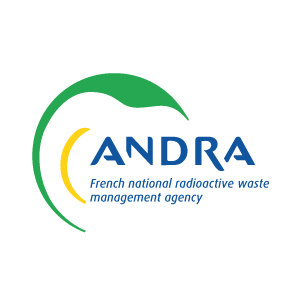
ANDRA
Member of Executive Group
Agence Nationale pour la gestion des déchets radioactifs
The French National Radioactive Waste Management Agency.
Contact: Stephan Schumacher Send message
ARAO
Slovenian Agency for Radioactive Waste Management
Contact: Leon Kegel Send message

BGE (Bundesgesellschaft für Endlagerung mbH)
Member of Executive Group
The German national waste management organisation.
Contact: Astrid Göbel Send message
Le Commissariat à l’énergie atomique et aux énergies alternatives (CEA)
French Alternative Energies and Atomic Energy Commission
Contact: Catherine Rabbe Send message
Centro de Investigaciones Energéticas, Medioambientales y Tecnológicas (CIEMAT)
Center for Energy, Environmental and Technological Research
Contact: Tiziana Missana Send message
Centre National de la Recherche Scientifique (CNRS)
The National Center for Scientific Research, France
Contact: Michel Cathelineau Send message
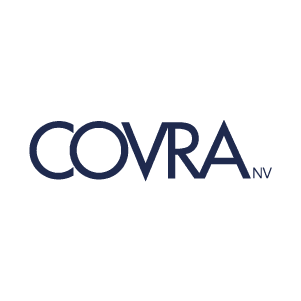
COVRA
Member of Executive Group
Centrale Organisatie Voor Radioactief Afval
Contact: Marja Vuorio Send message
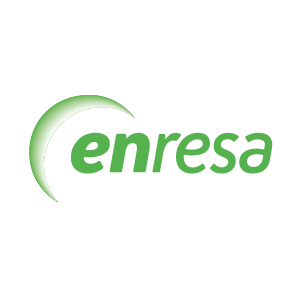
ENRESA
Member of Executive Group
Empresa Nacional de Residuos Radioactivos S.A.
Contact: Mariano Navarro Send message
Contact: Juan-Carlos Major Send message
Gesellschaft für Anlagen- und Reaktorsicherheit mbH (GRS)
Contact: Info Send message
Institute of Nuclear Chemistry and Technology (IChTJ)
Contact: Graznya Zakrzewska Send message
IST/CTN, Technical University of Lisbon
Contact: Isabel Paiva (radiation protection and radioactive waste management expert) Send message
Forschungszentrum Jülich
Contact: Dirk Bosbach Send message
Karlsruhe Institute of Technology (KIT)
Contact: Horst Geckeis Send message
Lithuanian Energy Institute (LEI)
Contact: Povilas Poškas Send message
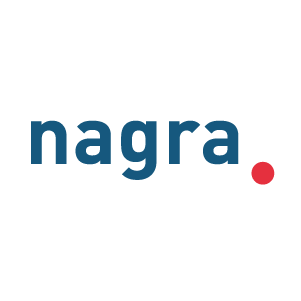
Nagra
Member of Executive Group
Nationale Genossenschaft für die Lagerung radioaktiver Abfälle
Contact: Irina Gaus Send message
Nuclear Research and Consultancy Group (NRG)
Contact: Arjen Poley Send message
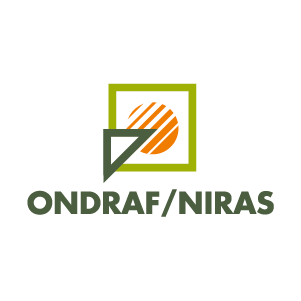
ONDRAF/NIRAS
Member of Executive Group
The Belgian Agency for Radioactive Waste and Enriched Fissile Materials
Contact: Maarten Van Geet Send message
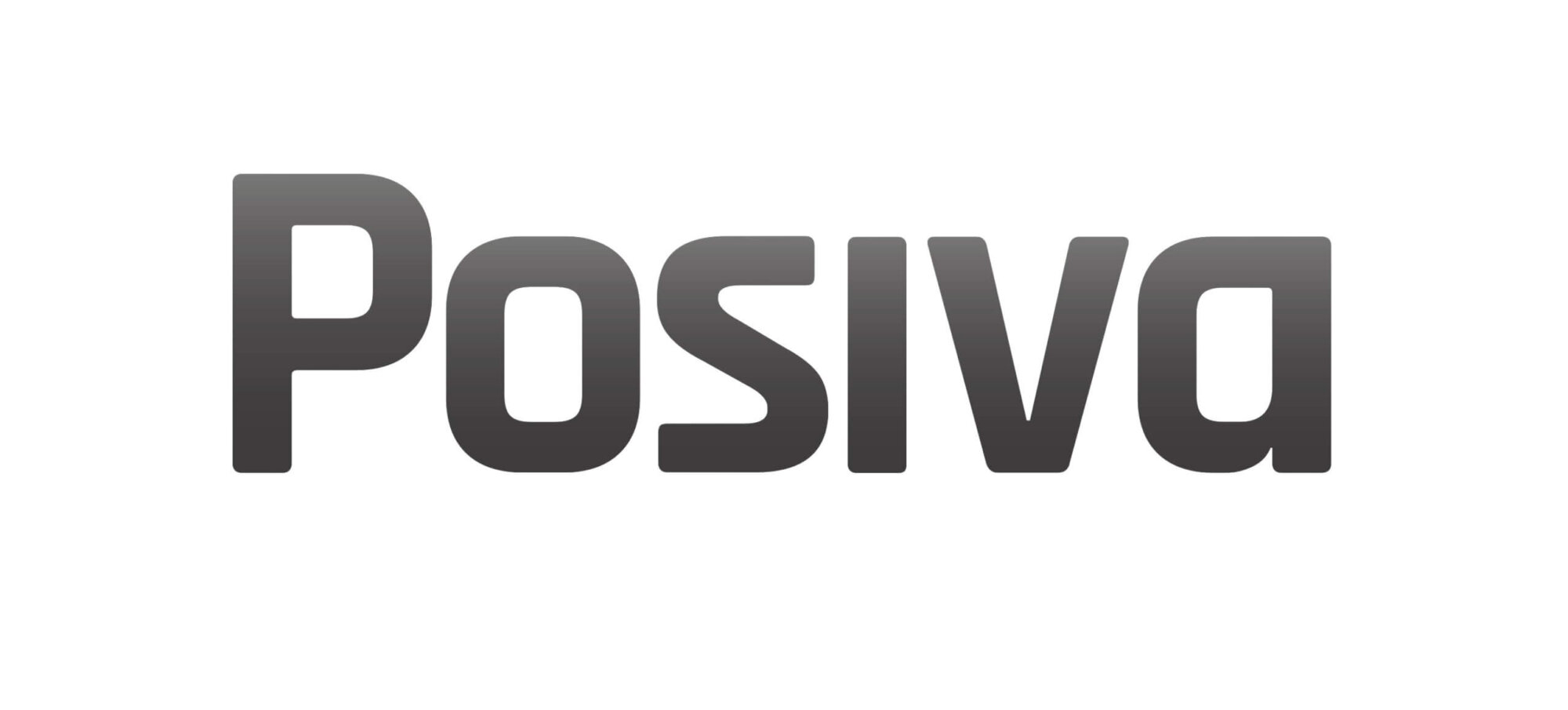
Posiva Oy
Member of Executive Group
Nuclear Waste Management Expert
Contact: Petteri Vuorio Send message
Contact: Johanna Hansen Send message
Laboratory for Waste Management (LES)/Paul Scherrer Institute (PSI)
Contact: Sergey Churakov Send message
Institutul de Cercetari Nucleare Pitesti (ICN Pitesti)
Institute for Nuclear Research Pitesti
Contact: Daniela Diaconu Send message
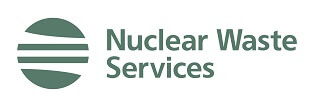
Nuclear Waste Services (NWS) [Previously RWM]
Member of Executive Group
Nuclear Waste Services (changed from Radioactive Waste Management Limited in 2022)
Contact: Jonathan Martin Send message
SCK – CEN
Belgian Nuclear Research Centre
Contact: Christophe Bruggeman Send message

Svensk Kärnbränslehantering AB (SKB)
Member of Executive Group
Svensk Kärnbränslehantering AB
Swedish Nuclear Fuel and Waste Management Co.
Contact: Anni Fritzell Send message

SÚRAO
Member of Executive Group
Správa úložišť radioaktivních odpadů
Radioactive Waste Repository Authority, Czechia
Contact: Lukáš Vondrovic Send message
Contact: Markéta Dohnálková Send message
Netherlands Organisation for Applied Scientific Research (TNO)
Contact: Mariëlle Koenen Send message
VTT Technical Research Centre of Finland
Contact: Erika Holt Send message

